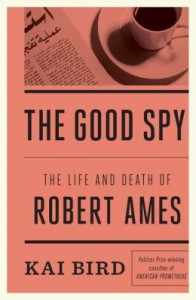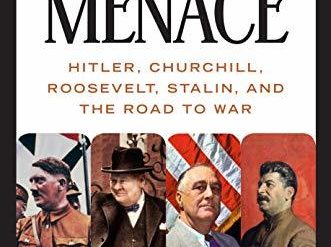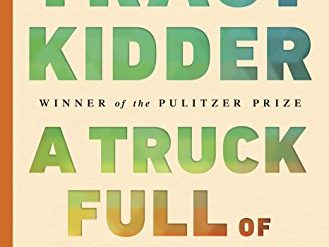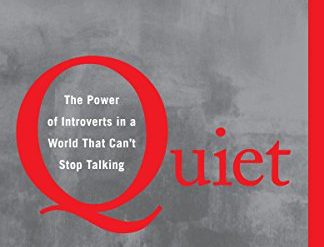
Chances are slim that you’ve ever heard of Robert Ames. I hadn’t. Bob Ames was a CIA officer for two decades in the 1960s and 70s. He was one of eight CIA employees to die in the bombing of the US Embassy in Beirut in 1983. Ames had risen to senior positions in the agency but never became its director. Why, then, would he be revered three decades later among many in the CIA, and why would anyone publish his biography? And how was he involved when Miss Universe and the CIA somehow turned up together?
The answer to those questions becomes self-evident in the pages of this thoroughly researched book. Ames was, in the view of many of his colleagues in life and no doubt more of them after his passing, the “good spy” of Kai Bird’s title — a brilliant example of the best the agency could field.
Bob Ames was an Arabist, not by heritage but by choice. As a private in the US Army stationed at a “listening station” in what is now Eritrea before he joined the CIA, he began studying the Arabic language. After many years of intensive study and postings in countries where the language was spoken, Ames became so proficient that for fun he could play word games in Arabic. His command of the language, unusual for US officials overseas in those days, played a major role in his storied career that encompassed eventful assignments in Saudi Arabia, South Yemen, and Lebanon.
The Good Spy: The Life and Death of Robert Ames by Kai Bird (2014) 464 pages ★★★★☆
Ames became the agency’s preeminent authority on the Middle East. President Carter’s Middle East expert on the National Security Council (NSC) told the author, “He was the most effective intelligence officer I ever encountered.” He provided vital information to the NSC under both Presidents Carter and Reagan and frequently briefed President Reagan in the years before he (Ames) died. Two of his closest friends — a Lebanese Shi’a businessman and a Palestinian Sunni terrorist leader — became major figures in the region, and his close relationships with them were the key to much of his success, not just in obtaining critical, up-to-the minute intelligence about the major events of the day but, at times, in being able to influence the course of events with their help.
Ames’ story is fascinating and historically significant, in large part because of his breakthrough success in gaining the trust, and then a deep friendship, with Ali Hassan Salameh, who was chief of intelligence for the Palestine Liberation Organization (PLO) and whom Yasir Arafat considered to be like a son. Salameh was a tall, handsome, flamboyant man who took Georgina Rizk (Miss Universe 1971) as his second wife; he commanded Arafat’s personal guards and participated in a number of high-profile terrorist attacks, though none of them against the US or European targets.
A back channel to Nasser Arafat was the centerpiece of Ames’ career
As the author writes, “Ames’ back channel to Salameh . . . created a virtual nonaggression pact between the U.S. government and Arafat’s Fatah guerrillas.” That relationship, the centerpiece of Ames’ career, lasted throughout the 1970s, often against orders. The PLO actively assisted the US government on several occasions, guaranteeing safe passage for American citizens and their allies in war-torn Lebanon and providing useful intelligence at times. In fact, as I read this book, it seemed to me that the connection between the PLO and the CIA was at least as strong as that between the CIA and the Mossad, Israel’s secret service, especially after the election of Menachem Begin as Israeli premier in 1977.
Begin, the champion of Jewish settlements in East Jerusalem and the West Bank, rejected US calls for moderation and repeatedly lied to US officials about Israel’s intentions in Lebanon, which the Israeli Defence Force invaded in 1982. The low point in that military action — known forever after as “Sharon’s War” for the Israeli Defence Minister, Ariel Sharon — was the reprehensible Israeli move to invite right-wing Christian Lebanese militias into the Sabra and Shatila refugee camps to carry out a vengeful massacre that cost the lives of 1,000 and 2,500 Muslims. Those events led directly to the creation of a new Iranian-backed Shi’ite militia that later became Hezbollah, which now controls Lebanon and constantly threatens war with Israel.
He died in a suicide truck-bomb attack
It is profoundly sad and ironic that the suicide truck-bomb attack in which Bob Ames died — like the even larger attack later in 1983 that took the lives of 241 US Marines in their barracks — “quite literally inspired Bin Laden’s suicidal assaults on America in [1998 and] 2001.” (After learning of these events, Bin Laden “sent a delegation of Al-Qaeda operatives to the Bekaa Valley in Lebanon for training in explosives and intelligence practices.”)
The Good Spy casts light on important historical events and figures in the Middle East during a tumultuous time in its history. Though reasonably well written on the whole, the author displayed an annoying habit of re-introducing people and events he had already described, sometimes only a few pages later. A better editor could have caught these errors.
For related reading
Like to read good biography? Check out 10 great biographies.
If you enjoy reading nonfiction in general, you might also enjoy Science explained in 10 excellent popular books or Top 10 nonfiction books about politics.
You might also be interested in seeing my post, 30 good nonfiction books about espionage.
And you can always find my most popular reviews, and the most recent ones, on the Home Page.



























Mal, thanks, this was an excellent recommendation! I am enjoying it now.